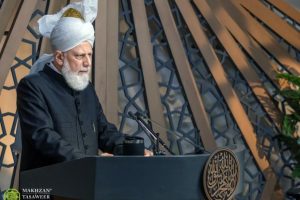A teacher reflects on the legacy of Islam’s strong emphasis on education while visiting a university founded by Muslim woman Fatima Al-Fihri.

Maurizio de Mattei | Shutterstock
Recently, I was blessed with the opportunity to visit Fez in Morocco. I walked through slender maze-like alleyways filled with tourists and local residents, selling everything from fruits to leather shoes. My husband and I were deep inside the exuberant and colourful medina when we arrived at our destination, a truly historical site. We could have missed it if it were not for the signs. Tucked away behind a small door and the towering walls of the medina was the entry to the oldest degree-granting university in the world, which is still in operation today. Hidden behind the small doors and narrow alleyways was an impressive courtyard with beautiful fountains and stairs to vast prayer halls.
Universities date back to medieval Europe, specifically the Universities of Bologna, Paris, Oxford and Cambridge. However, I visited and learned about an institution of higher learning that predates even these storied institutions.

The University and Mosque of Al Quaraouiyine, founded in 859 CE, was the largest mosque in the entirety of North Africa at the time of its construction. Not only is it inspirational to know that the oldest degree-granting university was founded by a Muslim, it may shock some to know it was initiated, planned and funded by a Muslim woman, over 1100 years ago.
Of course, as someone who knows Islam’s stance on the empowerment and education of women, I was less surprised and more inspired by this woman who was undoubtedly driven by the true teachings of Islam.

Milosk50 | Shutterstock
Fatima Al-Fihri was the daughter of a wealthy merchant and is defined in history as a pious Muslim woman. When she inherited a large sum of money from her father, instead of squandering it on herself, she made the selfless choice to use it to advance her community by funding and building a mosque and madrassa (school). Her financial sacrifice is the perfect example of putting one’s faith over all worldly things and the emphasis she put on education and religion show how devoted she was to the teachings of Islam.
Personally, as an elementary school teacher and a lifelong student, I have always found solace in and appreciation for the emphasis on education within Islam. With my experience of teaching in low-income neighbourhoods, I can easily recognise the impact a quality education, or the lack thereof, can have on a person’s life. Proper schooling is a blessing that most of us have been given, but all too many people go without.
Education is the key to moving humanity forward. Making schools and teachers available to all, allows for more equal opportunities for every person and will provide us with the cures to today’s world’s problems. Whether it is the earth’s climate crisis or making peace between nations, education lights the path to the solution.

Fongbeerredhot | Shutterstock
That is why I am grateful to be a member of the Ahmadiyya Muslim Community, which has invested in education and built schools worldwide, hoping to eliminate disparities in schooling based on gender and economic status. This community recognises the essential role of education in Islam, just as earlier Muslims did as well.
It is no coincidence that many of the Muslim men and women I have met since my conversion in 2014 are among the most educated people I know. Our faith clearly encourages, nay, obliges us to seek education.
‘It is the duty of every Muslim man and every Muslim woman to acquire knowledge.’ With this Hadith (oral tradition), the Prophet Muhammadsa makes it known that all of humanity should take full advantage of every opportunity for learning. He was also known to have said that one must search for education from the cradle until death, even if it meant travelling to China. The scholarly Fatima Al-Fihri enabled her community to be successful servants of God by providing them with resources for greater knowledge.
Nevertheless, it is undeniable that today there are many people who misunderstand the teachings of the true Islam. Many believe that Islam teaches the oppression of women, whereas that is completely contrary to the Islam that we find in the Qur’an and Ahadith. Before the advent of Prophet Muhammadsa, families would bury their infant daughters out of shame. But when he came, he outlawed this horrendous practice in Arabia and transformed the people by teaching men to respect women and value their daughters. The Holy Prophetsa said, ‘He who gives the best upbringing and education to his daughters shall enter Paradise.’ Here, again, he encouraged to spend their resources not only on their sons, but also on their daughters.
Some see men as oppressors of Muslim women, when in fact they are asked to be a source of empowerment and education for their daughters. While some Muslims are plainly going against the teachings of the Holy Prophetsa, oppressing women or depriving them of an education, the difference between them and Muslims adhering to true Islamic teachings is striking.

Muslims following the instructions of Prophet Muhammadsa understand the importance placed on education, especially for girls. As a result, we have countless examples of historical Muslim women who have been excellent contributors to society at large, like Fatima Al-Fihri.
This woman made an enormous sacrifice and founded a religious and educational establishment that changed history, and she is not alone. Empowered and educated Muslim women around the world are doctors, lawyers, educators, politicians and are successful in other fields as well. They are persevering high-achievers who are staying true to their faith.
In the centre of this stunning mosque and madrassa stands an elegant fountain. Created in honour of Fatima Al-Fihri, it is a reminder to us all. Never forget the lessons that can be learnt from such a pious woman. She made immense sacrifices by staying true to the teachings of Islam and valuing education for all in her community.
Let us pray to be among the true followers of Islam, who, like Fatima Al-Fihri, set an example for other Muslims. We must recognise that education is a wealth that cannot be taken from us.
‘He grants wisdom to whom He pleases, and whoever is granted wisdom has indeed been granted abundant good; and none would take heed except those endowed with understanding.’1
Let us always show gratitude to God for the knowledge He has blessed us with, continue striving for self-improvement and be advocates for equal education around the world.
………………………………………………………
About the Author: Samantha Issam is a preschool teacher in Chicago, Illinois. She has traveled extensively in Morocco, speaks French and is studying Arabic. She accepted Islam in 2014 after her own independent study and joined Islam Ahmadiyyat in 2015.
………………………………………………………..
Endnotes
1. The Holy Qur’an 2:270.




Add Comment